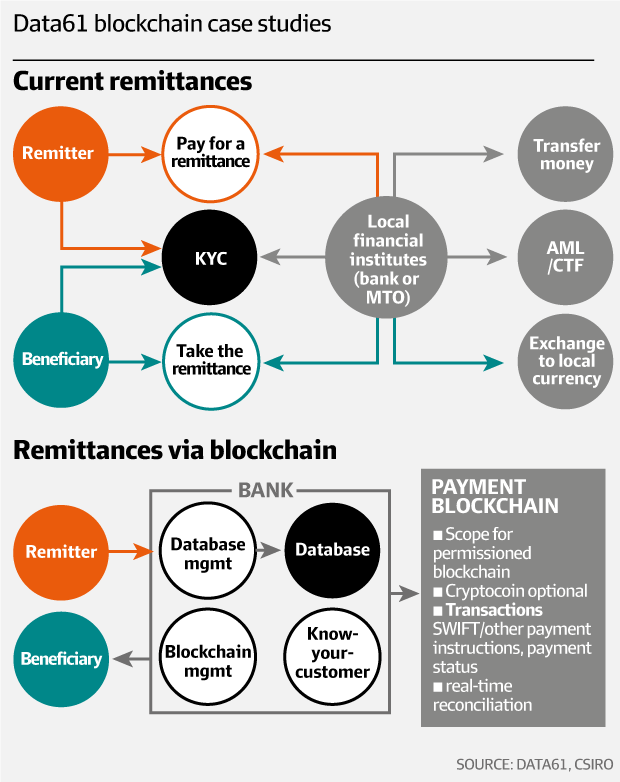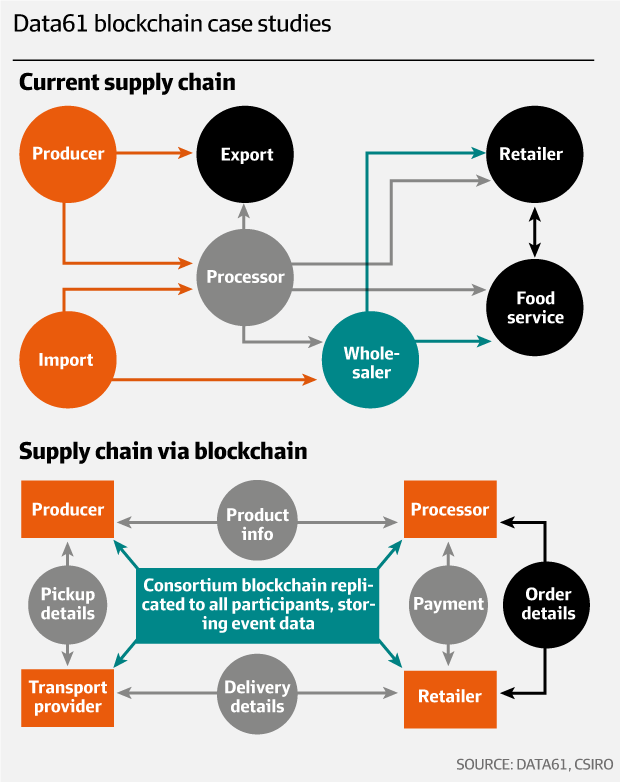Blockchain, a type ledger technology, has been under intense study for the last year by Australia’s Commonwealth Scientific and Industrial Research Organisation, or CSIRO, specifically by their Data61 group.
Data 61 is a partnership group dedicated to finding, creating, and studying data innovation. Therefore, their recently released reports pronouncing blockchain a “highly promising” way to manage supply chains for the government, finance, and industries and to increase Australia’s productivity are an exciting breakthrough that could put Australia at the forefront of technology and enterprise. But the CSIRO reports come with a warning that Blockchain may have some vulnerabilities as well.
After being commissioned by Australian Treasurer Scott Morrison, MP, in 2016, Data61 worked with input from governments and industries. Already a leader in this emergent technology, Morrison is advising its government and businesses to use the reports as “guidance on how they can accelerate their take up of blockchain technology.”
The Data61 reports explicate the “profound impact” blockchain could have on “delivering significant productivity, security, and efficiency gains” for Australia and the Australian economy, he added.
The reports include detailed case studies on the application of Blockchain to government data registries, international remittance payments, and trade finance.
However, there are warnings in two reports that should the encryption be broken by a fast enough computer then the very hyped technology could easily be corrupted, breaching confidentiality, compromising privacy, and creating security concerns.

Blockchain Explained
As previously mentioned, blockchain is a type of ledger technology that can perform some roles for businesses in many industries and government organizations. One main function is to act as a centralized and encrypted database of recorded transactions that are collectively owned. Pertinent information is synchronized and encrypted automatically across all interested parties. The ledger is unchangeable by outside parties and therefore impervious to fraud, as well as providing very efficient data sharing.
Another function of blockchains is to provide “smart contracts” which automatically perform business protocols or certain sections of legal agreements. Blockchain unerringly pinpoints a time, event, or action that can be trusted by others of being honest, correct, and not mismanaged.
According to Data61, blockchain could potentially create “programable money,” facilitate markets, manage corporate actions, and verify digital identities if necessary. Perhaps of greatest interest to the Australian government, the report allows that it could automate tax collection, manage data sets, and provide grants and social security.
Neutrality and Technology
Data61’s reports are mainly intended to advise businesses and discover if blockchain technology is right for them, identifying and considering some limitations and risks. At the same time, however, it presents a series of scenarios for the government to highlight possible pitfalls of digital economies if they fail to move fast enough to adapt to them. One of the main principles Data61 advises for regulators is on of “technological neutrality” regarding blockchain and providing “indicative guidance” when evaluating proposals.
One of the biggest concerns where technology and the business mix is that of privacy. Because information contained in a blockchain cannot be changed, “toxic data,” or maliciously inputted data can be recorded and cause legal issues when contracts are examined or the data ordered to be removed.
Another concern for potential blockchain users is that it is not future-proof. For example, the theoretical speeds of quantum computing could break through the current encryption abilities making blockchain vulnerable.
Additionally, Data61’s report points out that blockchain is not very well suited for large scale databases. Therefore big data would need to be stored in chain and that any fully utilized blockchain must be able to operate with other IT systems and human processes, in order to fit all computing needs.
A final consideration for the usability of blockchain to certain organizations is the more expensive cost of executing “smart contracts” in comparison to the processes already in use. So far, Data61 says, blockchain systems are being tested under the ideal or best possible conditions and may not take into account feasibility in certain difficult situations or unexpected stresses.

Eliminating Fraud in Supply Chains
Adrian Turner, CEO of Data 61, said, regardless of its limitations, blockchain is “here to stay” and Australia is well placed to be the first to benefit from the technology. He adds that blockchain had the capability to “drive operational efficiency and structural change for the country.” Specifically, he added, in food provenance and personalized healthcare applications.
For supply chains, blockchain could”not just to integrate information exchange and improve operational efficiencies across a diverse industry, but also to improve supply chain quality, facilitate provenance of branded goods and reduce the cost of regulatory approvals,” according to one report.
Craig Laundy, Assistant Minister of Industry, Innovation, and Science, said the blockchain technology could reduce costs for businesses, especially where it concerns shipping and payments. One of the greatest cost-saving and security avenues are the rates of fraud in food importation between China and Australia.
“This ultimately has the potential for our producers here to ensure the integrity of their supply chains internationally through foreign trade,” he said.
Although blockchain has historically a bad reputation due to “waters muddied somewhat with bitcoin and the dark web” said Laundy. But now, he adds, the future of blockchain and Australian business is at a crossroads where businesses must “embrace and invest, or ignore and perish.” If Australia can lead the way in creating standards for blockchain, then they can be sure it develops “in a way that can be built on internationally with confidence.”
Blockchain Bolsters Businesses
Scott Farrell, a partner at King & Wood Mallesons, who aided in the Data61 reports, said that blockchain’s capabilities to ensure trust between business partners must be understood by those companies if they want to strengthen their standings.
Mark Staples, a Data61 group leader and co-author of the reports, said Australia would “end up relying on blockchain-based systems for lots of reasons” given the “huge economic value” in the form of efficiencies. But he said it is much too early to quantify what these will be. “Critically, for those considering the technology from either a tactical or strategic perspective, the reports provide a scientific foundation for making decisions, not only on what the technology is and what it can do, but where it might lead us and how we might get there,” Farrell said in a note sent to his firms clients.
Rob Hanson, a senior research consultant with Data61 and a co-author of the report, said the technology is “primarily about productivity” and if endorsed by various governments would bolster GDP growth, which typically increases people’s trust.
In Australia, already a number of businesses are seriously considering blockchain applications. Turner pointed out several banks, ASX, AGL, and Australian Post amongst them as well as a start-up called AgriDigital who’s ledger is developed to eliminate the risk of default by grain buyers against growers.
Nicholas Giurietto, chief executive of Australian Digital Currency and Commerce Association, has said that Australian regulators have been fast in responding to the onset of digital currency, mentioning the recent lifting of double goods and services tax on digital currencies. He implored the Australian government to create a task-force specifically designed to oversee the adoption of the blockchain, to ensure there are no accidental legal barriers, and to retain the technological neutrality.
“Australia now has a clear picture of how blockchain technology could transform our economy in the coming decades. We now need to make a choice to accelerate our efforts, or see other countries overtake us while we pay the price of moving too slowly,” he said.
More News to Read











